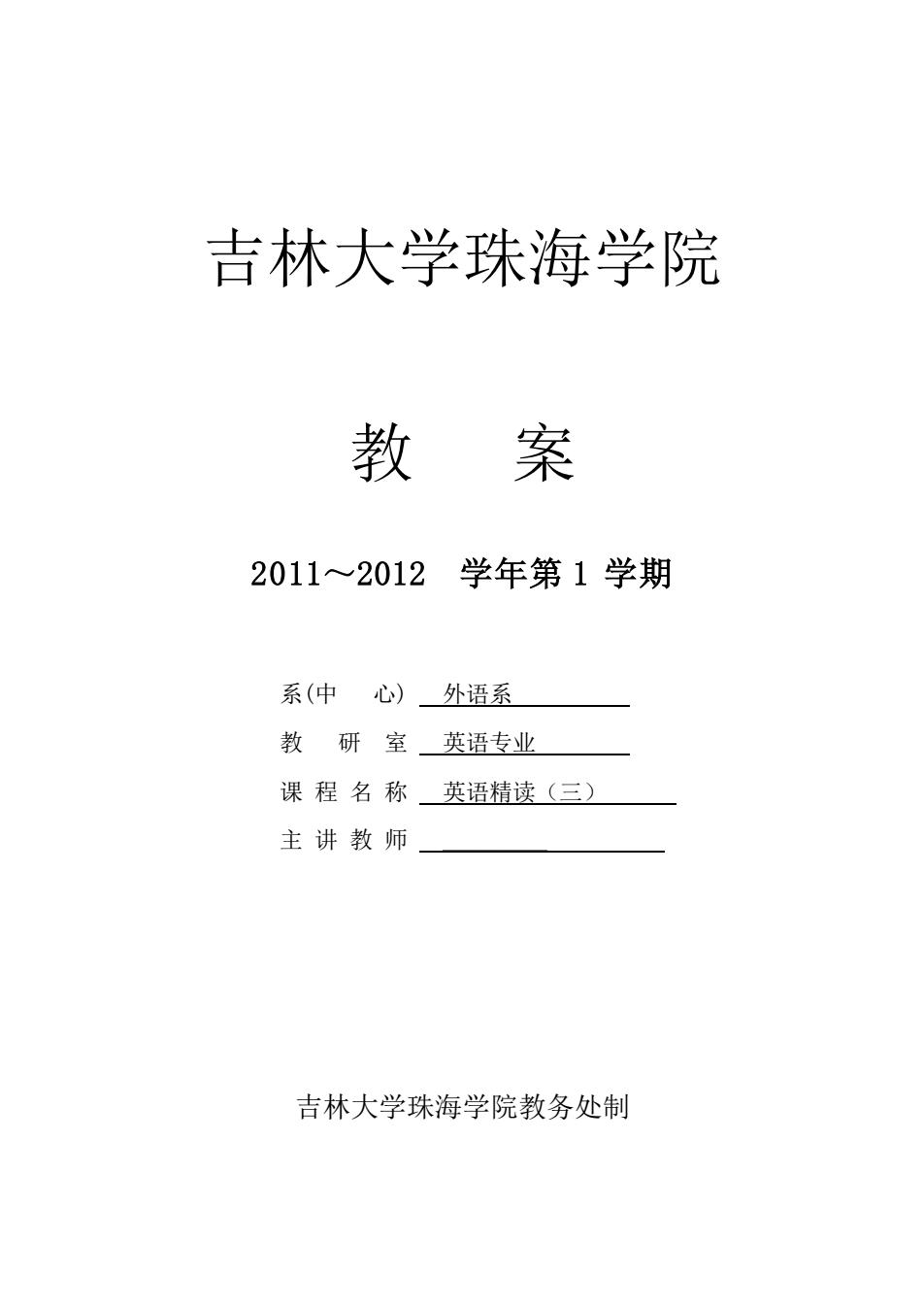
吉林大学珠海学院 教案 2011~2012学年第1学期 系(中心)外语系 教研室英语专业 课程名称英语精读(三) 主讲教师 吉林大学珠海学院教务处制
吉林大学珠海学院 教 案 2011~2012 学年第 1 学期 系(中 心) 外语系 教 研 室 英语专业 课 程 名 称 英语精读(三) 主 讲 教 师 _ 吉林大学珠海学院教务处制

讲授章节Lesson Seven The Greatest Invention 1 授课时数 2 periods 教学目的: Grasp the meaning of the text Analysize the text (main idea,structure) Learn more about fable and parable 教学内容(讲授提纲) I.Warming-up questions 1.Do you still remember the September 11 incident?Why do you think those terrorists can bring about such incidents? 2.What's the driving force of scientific development? 3.What's the purpose of science? 4.Since science is a double-edged sword,what should scientists do? II.About the author and the text ppt IlI.Understanding of the text The main idea A man,who had worked in the Ministry of Warfare of his country,believed that modern science had given small countries like theirs the power to conquer the world. They had a great scientist who had discovered a most deadly germ and a most effective way to spread it.But the scientist suddenly lost interest in this and turned his attention to other scientific wonders.In spite the man tried everything he could, the scientist refused to give up his wonderful research project just to please the overnment and help the government to develop a deadly weapon forworld domination. Finally the man's government had to execute the scientist and thus their marvelou plan failed. 2.Style The story was originally told by the strange man and retold by Jorkens.The whole story is written in the direct speech,thus the write adopts a colloquial style. 3.Structure Part 1 (Para.1-4) Jorkens talked with his friends at their club about the international situation. Part 2 (Para.5-44) (Para.5)Jorkens went to a port in the tropics where he met with a strange mar (Para.6-24)The strange man told Jorkens a story:He and his government had a great scientist and wanted the scientist's discovery to help them conquer the whole
讲授章节 Lesson Seven The Greatest Invention 1 授课时数 2 periods 教学目的: Grasp the meaning of the text Analysize the text (main idea, structure) Learn more about fable and parable 教 学 内 容(讲授提纲) I. Warming-up questions 1. Do you still remember the September 11 incident? Why do you think those terrorists can bring about such incidents? 2. What’s the driving force of scientific development? 3. What’s the purpose of science? 4. Since science is a double-edged sword, what should scientists do? II. About the author and the text ppt Ⅲ. Understanding of the text 1. The main idea A man, who had worked in the Ministry of Warfare of his country, believed that modern science had given small countries like theirs the power to conquer the world. They had a great scientist who had discovered a most deadly germ and a most effective way to spread it. But the scientist suddenly lost interest in this and turned his attention to other scientific wonders. In spite the man tried everything he could, the scientist refused to give up his wonderful research project just to please the government and help the government to develop a deadly weapon for world domination. Finally the man’s government had to execute the scientist and thus their marvelous plan failed. 2. Style The story was originally told by the strange man and retold by Jorkens. The whole story is written in the direct speech, thus the write adopts a colloquial style. 3. Structure Part 1 (Para. 1-4) Jorkens talked with his friends at their club about the international situation. Part 2 (Para. 5-44) (Para. 5) Jorkens went to a port in the tropics where he met with a strange man. (Para. 6 –24) The strange man told Jorkens a story: He and his government had a great scientist and wanted the scientist’s discovery to help them conquer the whole
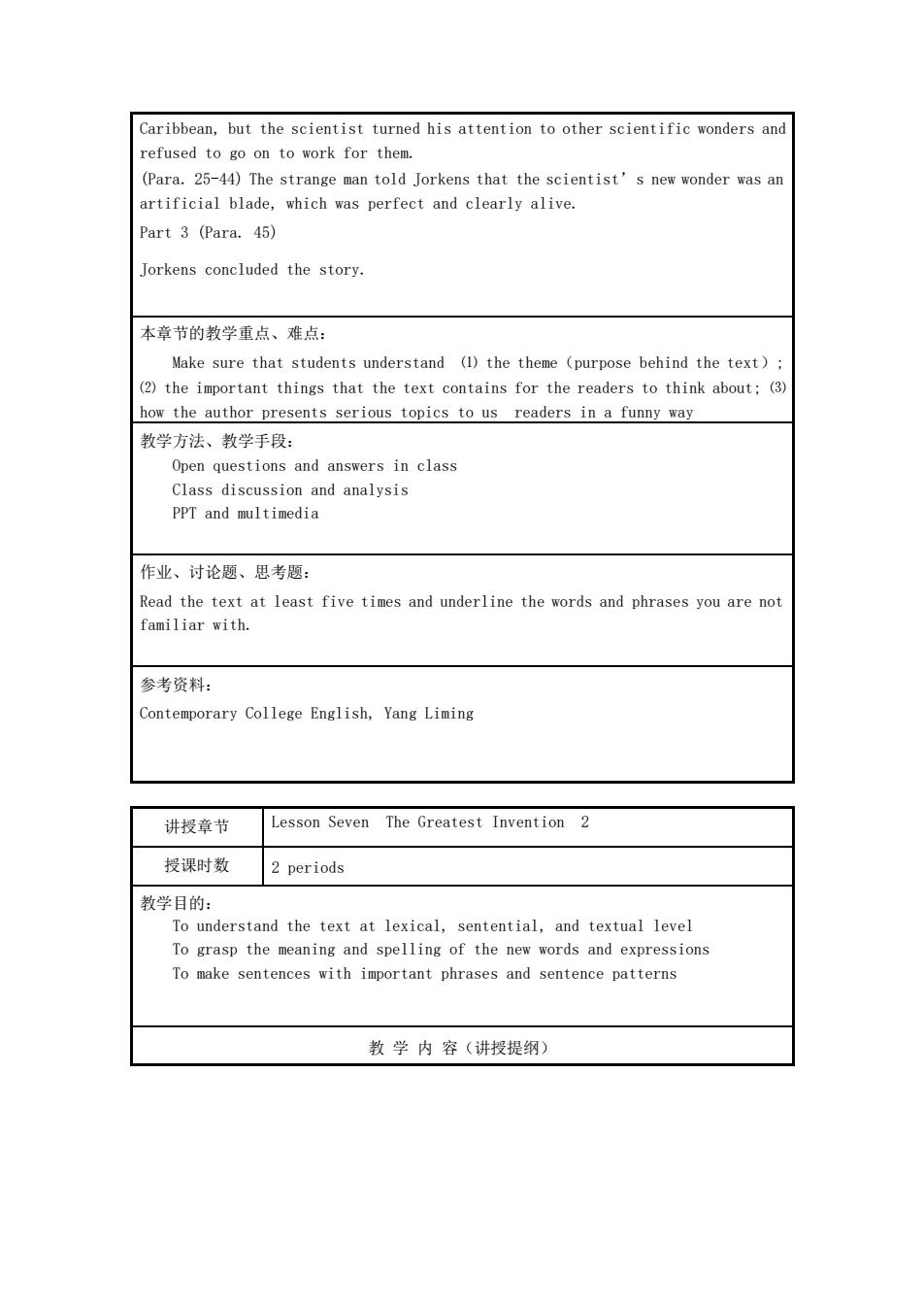
Caribbean,but the scientist turned his attention to other scientific wonders and refused to go on to work for them. (Para.25-44)The strange man told Jorkens that the scientist's new wonder was an artificial blade,which was perfect and clearly alive. Part 3 (Para.45) Jorkens concluded the story. 本章节的教学重点、难点: Make sure that students understand (1)the theme (purpose behind the text) (2)the important things that the text contains for the readers to think about:(3) how the author presents serious topics to us readers in a funny way 教学方法、教学手段: Open questions and answers in class Class discussion and analysis PPT and multimedia 作业、讨论题、思考题 Read the text at least five times and underline the words and phrases you are not familiar with. 参考资料: Contemporary College English,Yang Liming 讲授章节Lesson Seven The Greatest Invention2 授课时数2 periods 教学日的. understand the text at lexical,sentential,and textual level To grasp the meaning and spelling of the new ords and expressions To make sentences with important phrases and sentence patterns 教学内容(讲授提纲)
Caribbean, but the scientist turned his attention to other scientific wonders and refused to go on to work for them. (Para. 25-44) The strange man told Jorkens that the scientist’s new wonder was an artificial blade, which was perfect and clearly alive. Part 3 (Para. 45) Jorkens concluded the story. 本章节的教学重点、难点: Make sure that students understand ⑴ the theme(purpose behind the text); ⑵ the important things that the text contains for the readers to think about; ⑶ how the author presents serious topics to us readers in a funny way 教学方法、教学手段: Open questions and answers in class Class discussion and analysis PPT and multimedia 作业、讨论题、思考题: Read the text at least five times and underline the words and phrases you are not familiar with. 参考资料: Contemporary College English, Yang Liming 讲授章节 Lesson Seven The Greatest Invention 2 授课时数 2 periods 教学目的: To understand the text at lexical, sentential, and textual level To grasp the meaning and spelling of the new words and expressions To make sentences with important phrases and sentence patterns 教 学 内 容(讲授提纲)
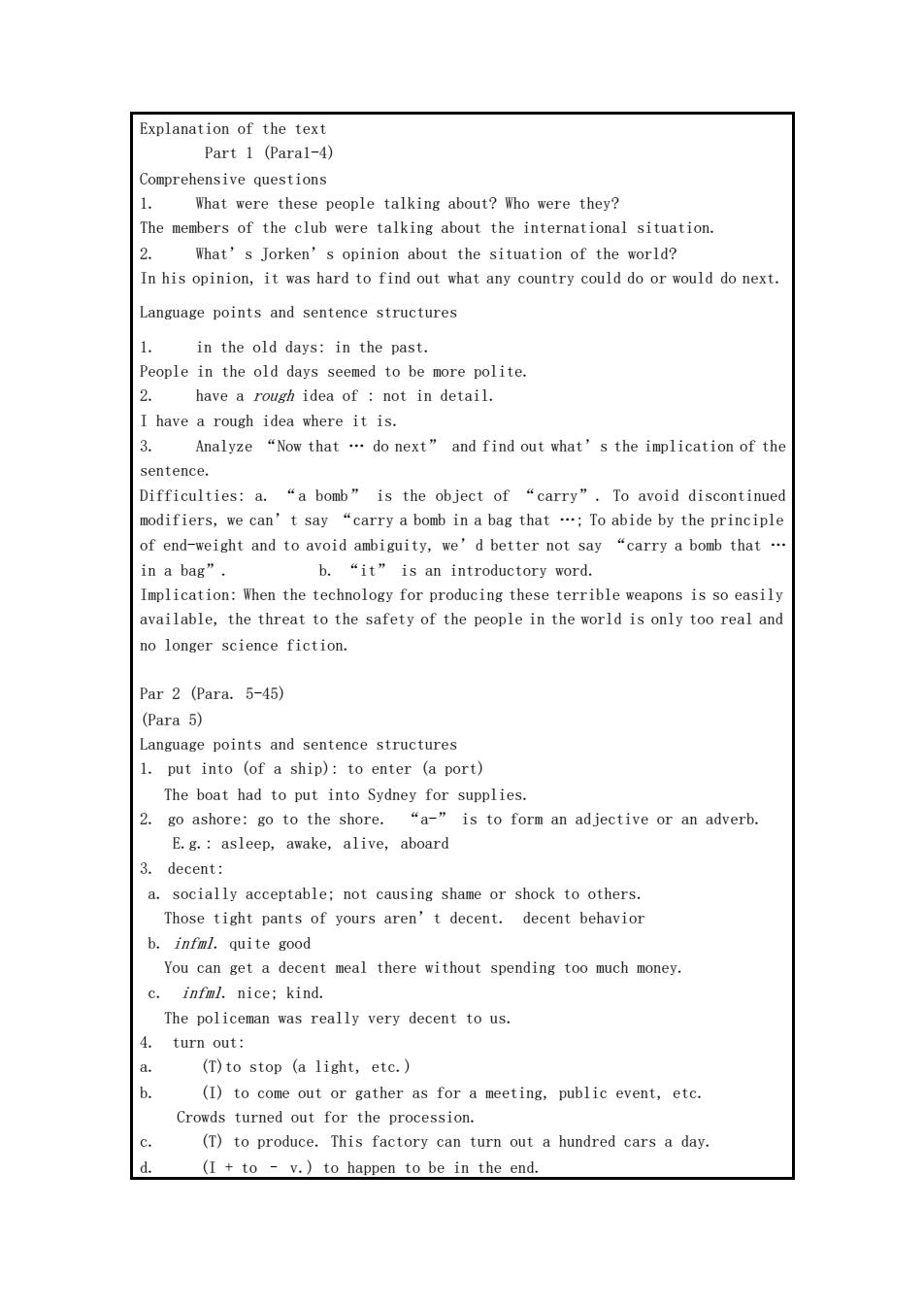
Explanation of the text Part 1 (Paral-4) Comprehensive questions 1. What were these people talking about?Who were they? The members of the club were talking about the international situation. What's Jorken's opinion about the situation of the world? In his opinion,it was hard to find out what any country could do or would do next. Language points and sentence structures 1. in the old days:in the past. People in the old days seemed to be more polite. have a rough idea of:not in detail I have a rough idea where it is. 3.Analyze "Now that.do next"and find out what's the implication of the sentence. Difficulties:a.“abob”is the object of“carry'”.To avoid discontinue modifiers,we can't say "carry a bomb in a bag that:To abide by the principle of end-weight and to avoid ambiguity,we'd better not say "carry a bomb that. in a bag”, b.“it”is an introductory word. Imlication:When the technology for producing these terrible weapons is so easily available,the threat to the safety of the people in the world is only too real and no longer science fiction. Par 2 (Para.5-45) (Para 5) Language points and sentence structures 1.put into (of a ship):to enter (a port) 2.go ashore:go to the shore. is to form an adjective or an adverb. E.g.:asleep,awake,alive,aboard 3.decent: socially acceptable:not causing shame or shock to others Those tight pants of yours aren't decent.decent behavior b.infml.quite good You can get a decent meal there without spending too much money. c.infml.nice:kind. The policeman was really very decent to us. 4.turn out: a (T)to stop (a light,etc.) (I)to come out or gather as for a meeting,public event,etc. Crowds turned out for the procession. (T)to produce.This factory can turn out a hundred cars a day. d (I to -v.)to happen to be in the end
Explanation of the text Part 1 (Para1-4) Comprehensive questions 1. What were these people talking about? Who were they? The members of the club were talking about the international situation. 2. What’s Jorken’s opinion about the situation of the world? In his opinion, it was hard to find out what any country could do or would do next. Language points and sentence structures 1. in the old days: in the past. People in the old days seemed to be more polite. 2. have a rough idea of : not in detail. I have a rough idea where it is. 3. Analyze “Now that . do next” and find out what’s the implication of the sentence. Difficulties: a. “a bomb” is the object of “carry”. To avoid discontinued modifiers, we can’t say “carry a bomb in a bag that .; To abide by the principle of end-weight and to avoid ambiguity, we’d better not say “carry a bomb that . in a bag”. b. “it” is an introductory word. Implication: When the technology for producing these terrible weapons is so easily available, the threat to the safety of the people in the world is only too real and no longer science fiction. Par 2 (Para. 5-45) (Para 5) Language points and sentence structures 1. put into (of a ship): to enter (a port) The boat had to put into Sydney for supplies. 2. go ashore: go to the shore. “a-” is to form an adjective or an adverb. E.g.: asleep, awake, alive, aboard 3. decent: a. socially acceptable; not causing shame or shock to others. Those tight pants of yours aren’t decent. decent behavior b. infml. quite good You can get a decent meal there without spending too much money. c. infml. nice; kind. The policeman was really very decent to us. 4. turn out: a. (T)to stop (a light, etc.) b. (I) to come out or gather as for a meeting, public event, etc. Crowds turned out for the procession. c. (T) to produce. This factory can turn out a hundred cars a day. d. (I + to – v.) to happen to be in the end

His statement turned out to be false. The party turned out a success. e [usu.Pass.to dress.She was well turned out for the party. 4.call for order.ask for 5.Analyze“When the bottle.moustache” a. “had been”is omitted in“and the wine poured out" b. "like liquid tropical sunlight"suggests that the wine was pretty strong, like hot liquid sunlight 6.Notice the way Jorkens described this man.See Note 9 (Teachers'Book). 本章节的教学重点、难点: put into:go ashore;decent:turn out;call for 教学方法、教学手段: Open questions and answers in class Class discussion and analysis PPT and multimedia 作业、讨论题、思考题: Exercises:P177-190 参考资料: Contemporary College English,Yang Liming 讲授章节 Lesson Seven The greatest Invention 3 授课时数2 periods 教学日的: To understand the textat lexical,sentential,and textual level To grasp the meaning and spelling of the new words and expressions To make sentences with important phrases and sentence patterns 教学内容(讲授提纲)
His statement turned out to be false. The party turned out a success. e. [usu. Pass.] to dress. She was well turned out for the party. 4. call for : order, ask for 5. Analyze “When the bottle.moustache”. a. “had been” is omitted in “and the wine poured out” b. “like liquid tropical sunlight” suggests that the wine was pretty strong, like hot liquid sunlight. 6. Notice the way Jorkens described this man. See Note 9 (Teachers’ Book). 本章节的教学重点、难点: put into; go ashore; decent; turn out; call for 教学方法、教学手段: Open questions and answers in class Class discussion and analysis PPT and multimedia 作业、讨论题、思考题: Exercises : P177-190 参考资料: Contemporary College English, Yang Liming 讲授章节 Lesson Seven The Greatest Invention 3 授课时数 2 periods 教学目的: To understand the text at lexical, sentential, and textual level To grasp the meaning and spelling of the new words and expressions To make sentences with important phrases and sentence patterns 教 学 内 容(讲授提纲)

(Para.6-24 Comprehensive questions 1.Where did the strange man use to work?How was his concept of war different from their Minister's? He used to work in their Ministry of warfare.Their Minister thought of war simply as an opportunity for cavalry charges and fine uniforms and glory.In his opinion, modern warfare gave grand opportunities to little countries,and small countries could depend on the intelligence of scientists to conquer the whole world. 2.Why did their plan fail? It was because the scientist turned his attention to other scientific wonders and refused to go on to work for them. Language points and sentence structures L.“We aimed at.n It was our aim or purpose to have complete control of the whole Caribbean aim at direct one's efforts (towards doing or obtaining something);intend (to) The factory must aim at increasing production. 2.a matter of 8 a little more or less than;about We only had to wait a matter of ten minutes. b.having as a part or result:needing. Answering this question is just a matter of using your intelligence. 3. "And we had.est of the Atlantic. We had a scientist who has been proved to be the very best in Latin American countries. 4.the figure of a soldier:the kind of person one would expect to see as a soldier tall and strong. 5.cavalry charges:charges on horseback.charge:a rush to the enemy to attack 6.just aspirations:fair:in accordance with what is right and true 7.once: c the Ministen of Warfare vas gone, ,.":(conj.)“from the moment that when”;“Omce,if a nation.”:(adv.)“at one time or there used to be a time or in the nast" 8.What if:See Note 4 9.have sth.within one's grasp:be able to achieve or attain sth. They were quite sure that they had the victory within their grasp. Humanity already has the technology within their grasp to send the first man to the Mars. 10.if only:See Note5 11.keep sb.at sth to force sb.to contime to do sth. 12.spur on:urge to faster action or greater effort. She spurred on her team to try harder. 13.content:adj.satisfied:happy (not used before a noun)be to do /with
(Para. 6-24) Comprehensive questions 1. Where did the strange man use to work? How was his concept of war different from their Minister’s? He used to work in their Ministry of warfare. Their Minister thought of war simply as an opportunity for cavalry charges and fine uniforms and glory. In his opinion, modern warfare gave grand opportunities to little countries, and small countries could depend on the intelligence of scientists to conquer the whole world. 2. Why did their plan fail? It was because the scientist turned his attention to other scientific wonders and refused to go on to work for them. Language points and sentence structures 1. “We aimed at .” It was our aim or purpose to have complete control of the whole Caribbean. aim at : direct one’s efforts (towards doing or obtaining something); intend (to) The factory must aim at increasing production. 2. a matter of : a. a little more or less than; about We only had to wait a matter of ten minutes. b. having as a part or result; needing. Answering this question is just a matter of using your intelligence. 3. “And we had.west of the Atlantic.” We had a scientist who has been proved to be the very best in Latin American countries. 4. the figure of a soldier: the kind of person one would expect to see as a soldier, tall and strong. 5. cavalry charges: charges on horseback. charge: a rush to the enemy to attack. 6. just aspirations: fair; in accordance with what is right and true 7. once: “Once the Ministen of Warfare was gone,.”: (conj.) “from the moment that; when”; “Once, if a nation.”: (adv.) “at one time or there used to be a time or in the past” 8. What if: See Note 4 9. have sth. within one’s grasp: be able to achieve or attain sth. They were quite sure that they had the victory within their grasp. Humanity already has the technology within their grasp to send the first man to the Mars. 10. if only: See Note 5 11. keep sb. at sth.: to force sb. to continue to do sth. 12. spur on: urge to faster action or greater effort. She spurred on her team to try harder. 13. content: adj. satisfied; happy (not used before a noun) be ~ to do /with
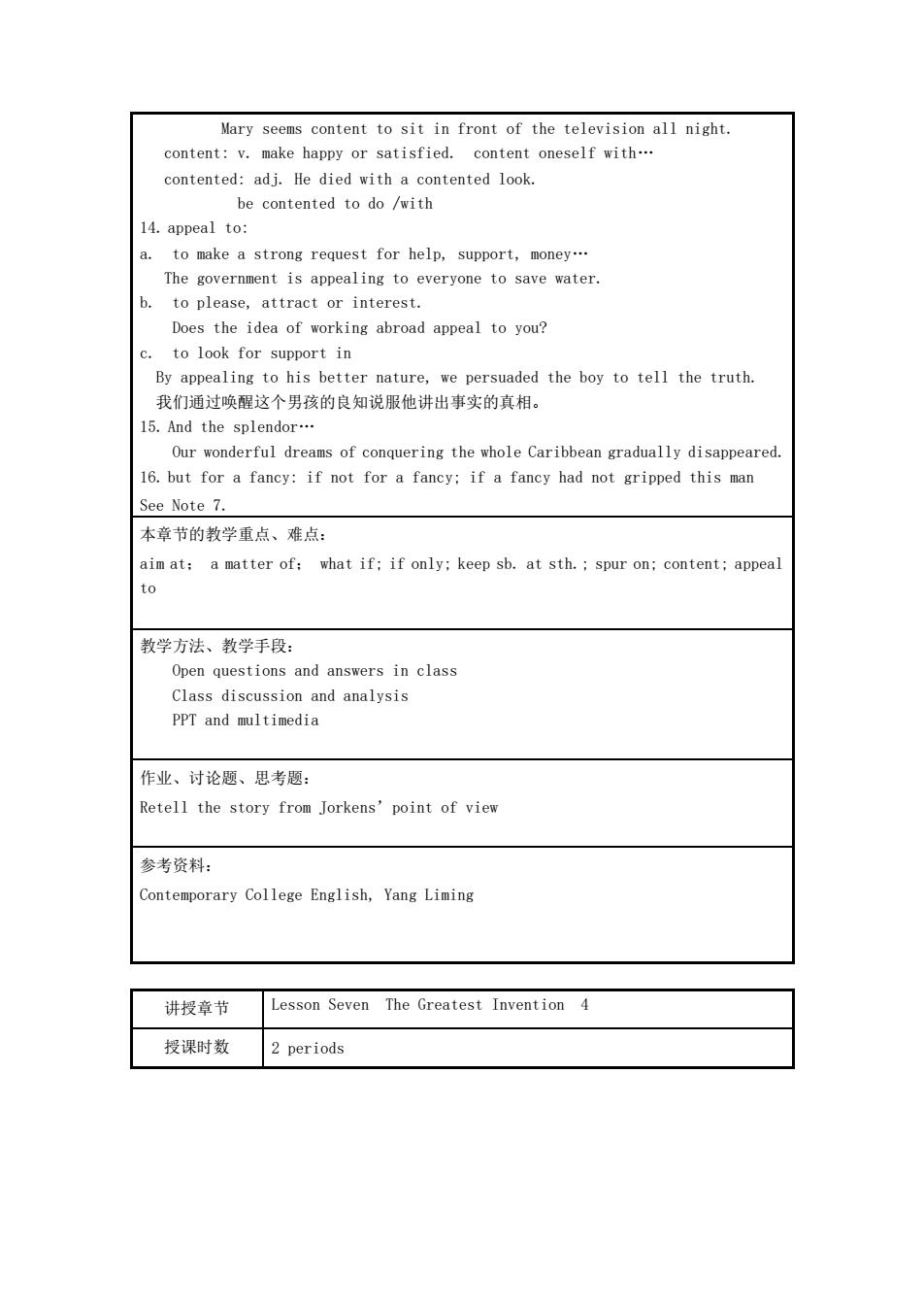
Mary seems content to sit in front of the television all night. content:v.make happy or satisfied.content oneself with. contented:adj.He died with a contented look. he contented to do /with 14.appeal to: a.to make a strong request for help,support,money. The government is appealing to everyone to save water. h.to please.attract or interest. Does the idea of working abroad appeal to you? c. to look for support in By appealing to his better nature,we persuaded the boy to tell the truth. 我们通过晚醒这个男孩的良知说服他讲出事实的真相。 15.And the splendor. Our wonderful dreams of conquering the whole Caribbean gradually disappeared 16.but for a fancy:if not for a fancy;if a fancy had not gripped this man See Note 7. 本章节的教学重点、难点: aim at:a matter of:what if;if only:keep sb.at sth.;spur on;content;appeal 教学方法、教学手段: Open questions and answers in class Class discussion and analysis PPT and multimedia 作业、讨论题、思考题: Retell the story from Jorkens'point of view 参考资料: Contemporary College English,Yang Liming 讲授章节Lesson Seven The Greatest Invention4 授课时数 2 periods
Mary seems content to sit in front of the television all night. content: v. make happy or satisfied. content oneself with. contented: adj. He died with a contented look. be contented to do /with 14. appeal to: a. to make a strong request for help, support, money. The government is appealing to everyone to save water. b. to please, attract or interest. Does the idea of working abroad appeal to you? c. to look for support in By appealing to his better nature, we persuaded the boy to tell the truth. 我们通过唤醒这个男孩的良知说服他讲出事实的真相。 15. And the splendor. Our wonderful dreams of conquering the whole Caribbean gradually disappeared. 16. but for a fancy: if not for a fancy; if a fancy had not gripped this man See Note 7. 本章节的教学重点、难点: aim at; a matter of; what if; if only; keep sb. at sth.; spur on; content; appeal to 教学方法、教学手段: Open questions and answers in class Class discussion and analysis PPT and multimedia 作业、讨论题、思考题: Retell the story from Jorkens’point of view 参考资料: Contemporary College English, Yang Liming 讲授章节 Lesson Seven The Greatest Invention 4 授课时数 2 periods

教学目的: the text at lexical, (3)To use the key words and phrases freely and finish the exercises independently: 教学内容(讲授提纲) (Para.25-44) Comnrehensive Questions 1.What new project attracted the scientist's attention? Making an artificial blade of grass. 2.Did the man from the Ministry try hard to change the scientist's mind? Yes.He even threatened him with death. 3.What happened in the end? The scientist refused to go on to work on their project and was executed Language points and sentence structures 1."You see no blade different from the rest?" This is called“an intonation question” -a statement in form but a question in meaning.It is used when the expected response is yes.This kind of questio always requires the use of the rising tune. 2.facility:everything needed to learn about the whole process Part 3 (Para.45) Comprehensive questions 1.What's the implication of "or that the influence of the strange wine was over"? Why did Jorkens mention“wine”so many times? The man told the story under the influence of wine,that is,when he was drunk Therefore,the story was not reliable. Language points and sentence structures 1.gaze at:look steadily at for a period of time She sat by the river,gazing down at the rolling water 2.lose the grip on:lose the power and control over I am too nervous:I seem to be losing the grip on my brain. Debate Argument:Scientists should give their attention to their moral responsibility for what they bring to humanity. Counter-argument:Scientists should just concentrate on their research without bothering about the social consequences of their discoveries. Exercises
教学目的: Enable students ⑴To understand the text at lexical, sentential, and textual level; ⑵To discuss relevant topics like the purpose of science, the driving force of scientific development and terrorism; ⑶To use the key words and phrases freely and finish the exercises independently; 教 学 内 容(讲授提纲) (Para. 25-44) Comprehensive Questions 1. What new project attracted the scientist’s attention? Making an artificial blade of grass. 2. Did the man from the Ministry try hard to change the scientist’s mind? Yes. He even threatened him with death. 3. What happened in the end? The scientist refused to go on to work on their project and was executed. Language points and sentence structures 1. “You see no blade different from the rest?” This is called “an intonation question”- a statement in form but a question in meaning. It is used when the expected response is yes. This kind of question always requires the use of the rising tune. 2. facility: everything needed to learn about the whole process Part 3 (Para. 45) Comprehensive questions 1. What’s the implication of “or that the influence of the strange wine was over”? Why did Jorkens mention “wine” so many times? The man told the story under the influence of wine, that is, when he was drunk. Therefore, the story was not reliable. Language points and sentence structures 1. gaze at: look steadily at for a period of time She sat by the river, gazing down at the rolling water. 2. lose the grip on: lose the power and control over I am too nervous; I seem to be losing the grip on my brain. Debate Argument: Scientists should give their attention to their moral responsibility for what they bring to humanity. Counter-argument: Scientists should just concentrate on their research without bothering about the social consequences of their discoveries. Exercises
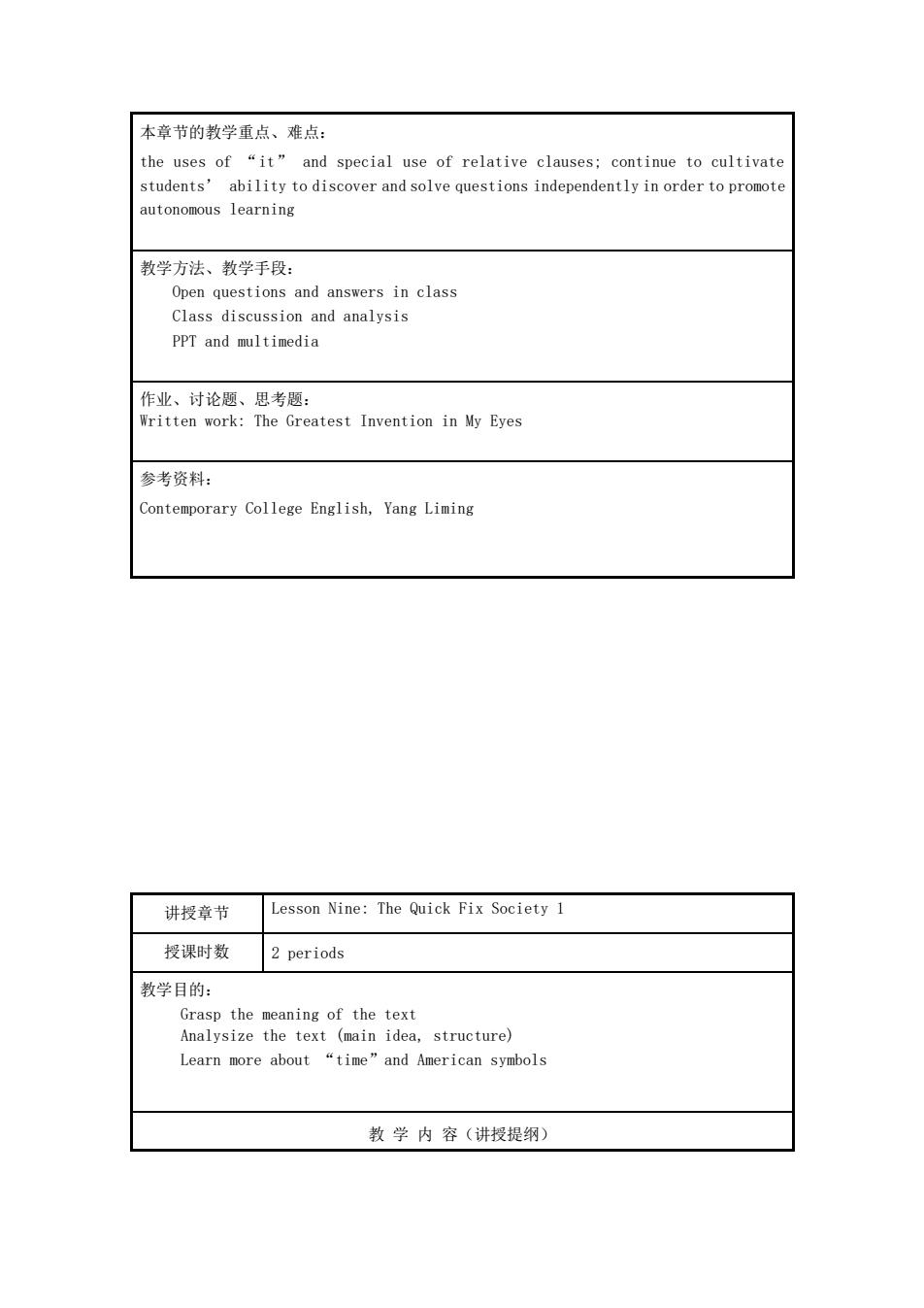
本章节的教学重点、难点: the uses of "it"and special use of relative clauses;continue to cultivate students'ability to discover and solve questions independently in order to promote autonomous learning 教学方法、教学手段: Open questions and answers in class Class discussion and analysis PPT and multimedia 作业、讨论题、思考题: Written work:The Greatest Invention in My Eves 参考资料: Contemporary College English,Yang Liming 讲授意节 Lesson Nine:The Quick Fix Society 1 授课时数 2 periods 教学日的: Grasp the meaning of the text Analysize the text (main idea,structure) Learn more about“tic ”and American symbols 教学内容(讲授提纲)
本章节的教学重点、难点: the uses of “it” and special use of relative clauses; continue to cultivate students’ ability to discover and solve questions independently in order to promote autonomous learning 教学方法、教学手段: Open questions and answers in class Class discussion and analysis PPT and multimedia 作业、讨论题、思考题: Written work: The Greatest Invention in My Eyes 参考资料: Contemporary College English, Yang Liming 讲授章节 Lesson Nine: The Quick Fix Society 1 授课时数 2 periods 教学目的: Grasp the meaning of the text Analysize the text (main idea, structure) Learn more about “time”and American symbols 教 学 内 容(讲授提纲)

I.Warming-up questions Begin the class from the understanding of the title. What does“Quick Fix Society”mean? In the society,people are concerned more about what they can achieve quickly they are eager to get quick results in every aspect of life.Do you agree with it?Ss are asked to carry out a discussion of the question 4 on page 287 of our rthat people are getting too impatient and too sessditth quick fix for everything,what examples would you give to illustrate your point? (Based your observations on your experience in China.)How is it reflected in our transportation and communication?How is it shown in our eating habits?Does it our consumption and habits as well as our production?Ho abou entertainment or amusement?Are our reading,writing,learning habits alse changed?What has this "fast-fix"attitude done to our human relationships?Has it caused health problems?Has it reduced our capacity for enjoying life? If you disagree with it and think that the desire for speed ids basically good, because f the fast pace of human life,many families cannot eat together around the family table every evening.Many people have to be at work during the normal dinner hours.For this reason,fast-food restaurants have become very popular.These restaurants are really fast and inexpensive,and also convenient.However,fast food has its shortcomings,too.Most fast-food meals healthy.in fats and chol sterol and low inothe mportant nutrients. It is advisable not to eat too much fast food II.Background 1.Symbols of the USA:There are many symbols that represent the United States of the osarones are the Stars and Stripes (the US lap (the national bird) hington Monument,the Lincoln Memoria the Statue of Liberty (a gift from France),Uncle Sam (a cartoon figure designe by Thomas Nast),etc. 2.Fast roads in the U.S. Highways:connect cities a road with six or more lanes Interstate highways:connect cities in different states Freeways:roads within a city Expressways:fast roads in or near cities Turnpike:pay money before you use it 3.dis Van Beethoven (1770-1872)is one of the greatest composers in the world who composed nine symphonies and numerous other famous works during his lifetime.His Fifth S分mphony(命运交啊曲)was produced at the height of his creative career probably around 1816. III.Structure
I. Warming-up questions Begin the class from the understanding of the title. What does “Quick Fix Society” mean? In the society, people are concerned more about what they can achieve quickly, they are eager to get quick results in every aspect of life. Do you agree with it? Ss are asked to carry out a discussion of the question 4 on page 287 of our textbook in groups: If you agree that people are getting too impatient and too obsessed with the quick fix for everything, what examples would you give to illustrate your point? (Based your observations on your experience in China.) How is it reflected in our transportation and communication? How is it shown in our eating habits? Does it affect our consumption and habits as well as our production? How about entertainment or amusement? Are our reading, writing, learning habits also changed? What has this “fast-fix” attitude done to our human relationships? Has it caused health problems? Has it reduced our capacity for enjoying life? If you disagree with it and think that the desire for speed ids basically good, how would you defend your position. For example, because of the fast pace of human life, many families cannot eat together around the family table every evening. Many people have to be at work during the normal dinner hours. For this reason, fast-food restaurants have become very popular. These restaurants are really fast and inexpensive, and also convenient. However, fast food has its shortcomings, too. Most fast-food meals are not very healthy. They are often high in fats and cholesterol, and low in other important nutrients. It is advisable not to eat too much fast food. II. Background 1. Symbols of the USA: There are many symbols that represent the United States of America. Some of the most popular ones are the Stars and Stripes (the US flag), the bald eagle (the national bird), the Washington Monument, the Lincoln Memorial, the Statue of Liberty (a gift from France), Uncle Sam (a cartoon figure designed by Thomas Nast), etc. 2. Fast roads in the U.S. • Highways: connect cities • Superhighways: a road with six or more lanes • Interstate highways: connect cities in different states • Freeways: roads within a city • Expressways: fast roads in or near cities • Turnpike: pay money before you use it 3. Ludwig Van Beethoven (1770-1872) is one of the greatest composers in the world who composed nine symphonies and numerous other famous works during his lifetime. His Fifth Symphony (命运交响曲) was produced at the height of his creative career probably around 1816. III. Structure